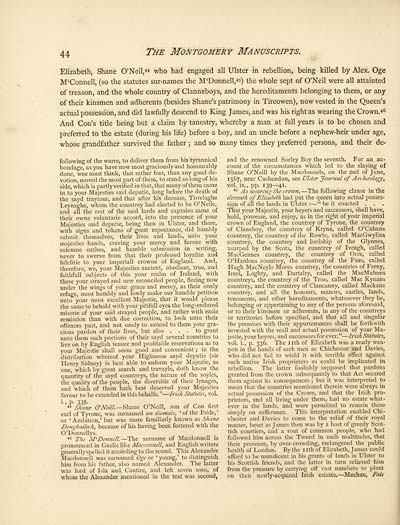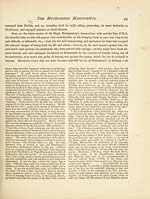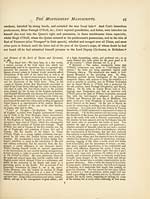Montgomery manuscripts
(58) Page 44
Download files
Complete book:
Individual page:
Thumbnail gallery: Grid view | List view

44
The Montgomery Manuscripts.
Elizabeth, Shane O'Neil," who had engaged all Ulster in rebellion, being killed by Alex. Oge
M'Connell, (so the statutes sur-names the M'Donnell/s) the whole sept of O'Neil were all attainted
of treason, and the whole country of Clanneboys, and the hereditaments belonging to thern, or any
of their kinsmen and adherents (besides Shane's patrimony in Tireowen), now vested in the Queen's
actual possession, and did lawfully descend to King James, and was his right as wearing the Crown. 4«
And Con's title being but a claim by tanestry, whereby a man at full years is to be chosen and
preferred to the estate (during his life) before a boy, and an uncle before a nephew-heir under age,
whose grandfather survived the father ; and so many times they preferred persons, and their de-
following of the warre, to deliver them from his tyrannical
bondage, as you have now most graciously and honourably
done, wee must think, that rather fear, than any good de-
votion, moved the most part of them, to stand so long of his
side, which is partly verified in that, that many of them came
in to your Majesties said deputie, long before the death of
the sayd traytour, and that after his decease, Tirrelaghe
Leynaghe, whom the countrey had elected to be O'Neile,
and all the rest of the said lords and captains came of
their owne voluntarie accord, into the presence of your
Majesties said deputie, being then in Ulster, and there,
with signs and tokens of great repentance, did humbly
submit themselves, their lives and lands, unto your
majesties hands, craving your mercy and favour with
solemne oathes, and humble submission in writing,
never to swerve from that their professed loyaltie and
fidelitie to your imperiall crowne of England. And,
therefore, we, your Majesties ancient, obedient, true, and
faithfull subjects of this your realm of Ireland, with
these your strayed and new reconciled people, fleeing now
under the wings of your grace and mercy, as their onely
refuge, most humbly and lowly make our humble petition
unto your most excellent Majestie, that it would please
the same to behold with your pitifull eyes the long-endured
miserie of your said strayed people, and rather with easie
remission than with due correction, to look unto their
offences past, and not onely to extend to them your gra-
cious pardon of their lives, but also ... to grant
unto them such portions of their sayd several countries to
live on by English tenure and profitable reservations as to
your Majestie shall seem good and convenient ; in the
distribution whereof your Highnesse sayd deputie (sir
Henry Sidney) is best able to enform your Majestie, as
one, which by great search and travayle, doth know the
quantity of the sayd countreys, the nature of the soyles,
the quality of the people, the diversitie of their lynages,
and which of them hath best deserved your Majesties
favour to be extended in this behalfe. "—Irish Statutes, vol.
i. P* 335*
"Shane O'Neill. —Shane O'Neill, son of Con first
earl of Tyrone, was surnamed an diomais, 'of the Pride,'
or 'Ambition,' but was more familiarly known as Shane
Donghailech, because of his having been fostered with the
O'Donncllys.
4S The McDonnell.— The surname of Macdonnell is
pronounced in Gaelic like Macconncll, and English writers
generallyspelled it according to the sound. This Alexander
Macdonnell was surnamed Oge or 'young,' to distinguish
him from his father, also named Alexander. The latter
was lord of Isla and Cantire, and left seven sons, of
whom the Alexander mentioned in the text was second,
and the renowned Sorley Boy the seventh. For an ac-
count of the circumstances which led to the slaying of
Shane O'Neill by the Macdonnels, on the 2nd of June,
1567, near Cushendun, see Ulster Journal of Archeology,
vol. ix., pp. 139 — 41.
* As wearing the crown. — The following clause in the
eleventh of Elizabeth had put the queen into actual posses-
sion of all the lands in Ulster : — " be it enacted . . .
That your Majestie, your heyers and successors, shall have,
hold, possesse, and enjoy, as in the right of your imperial
crown of England, the countrey of Tyrone, the countrey
of Claneboy, the countrey of Kryne, called O'Cahans
countrey, the countrey of the Rowte, called MacGwylins
countrey, the countrey and lordship of the Glynnes,
usurped by the Scots, the countrey of Ivcagh, called
MacGennes countrey, the countrey of Orre, called
O'Hanlons countrey, the countrey of the Fues, called
Hugh MacNeyle Mores countrey, the countries of Ferny,
Ireel, Loghty, and Dartalry, caUed the MacMahons
countreys, the countrey of the Troo, called Mac Kynans
countrey, and the countrey of Clancanny, called Mackans
countrey, and all the honours, manors, castles, lands,
tenements, and other hereditaments, whatsoever they be,
belonging or appertaining to any of the persons aforesaid,
or to their kinsmen or adherents, in any of the countreys
or territories before specified, and that all and singular
the premises with their appurtenances shall be forthwith
invested with the reall and actual possession of your Ma-
jestie, your heyres, and successors for ever."— Irish Statutes,
vol. i., p. 336. The nth of Elizabeth was a ready wea-
pon in the hands of such men as Chichester and Davies,
who did not fail to wield it with terrible effect against
such native Irish proprietors as could be implicated in
rebellion. The latter foolishly supposed that pardons
granted from the crown subsequently to that Act secured
them against its consequences ; but it was interpreted to
mean that the countries mentioned therein were always in
actual possession of the Crown, and that the Irish pro-
prietors, and all living under them, had no estate what-
ever in the lands, and were permitted to remain there
simply on sufferance. This interpretation enabled Chi-
chester and Davies to come to the relief of their royal
master, beset as James then was by a host of greedy Scot-
tish courtiers, and a rout of common people, who had
followed him across the Tweed in such multitudes, that
their presence, by over-crowding, endangered the public
health of London. By the I Ith of Elizabeth, James could
afford to be munificent in his grants of lands in Ulster to
his Scottish friends, and the latter in turn relieved him
from the pressure by carrying off vast numbers to plant
on their newly-acquired Irish estates. — Meehan, Fate
The Montgomery Manuscripts.
Elizabeth, Shane O'Neil," who had engaged all Ulster in rebellion, being killed by Alex. Oge
M'Connell, (so the statutes sur-names the M'Donnell/s) the whole sept of O'Neil were all attainted
of treason, and the whole country of Clanneboys, and the hereditaments belonging to thern, or any
of their kinsmen and adherents (besides Shane's patrimony in Tireowen), now vested in the Queen's
actual possession, and did lawfully descend to King James, and was his right as wearing the Crown. 4«
And Con's title being but a claim by tanestry, whereby a man at full years is to be chosen and
preferred to the estate (during his life) before a boy, and an uncle before a nephew-heir under age,
whose grandfather survived the father ; and so many times they preferred persons, and their de-
following of the warre, to deliver them from his tyrannical
bondage, as you have now most graciously and honourably
done, wee must think, that rather fear, than any good de-
votion, moved the most part of them, to stand so long of his
side, which is partly verified in that, that many of them came
in to your Majesties said deputie, long before the death of
the sayd traytour, and that after his decease, Tirrelaghe
Leynaghe, whom the countrey had elected to be O'Neile,
and all the rest of the said lords and captains came of
their owne voluntarie accord, into the presence of your
Majesties said deputie, being then in Ulster, and there,
with signs and tokens of great repentance, did humbly
submit themselves, their lives and lands, unto your
majesties hands, craving your mercy and favour with
solemne oathes, and humble submission in writing,
never to swerve from that their professed loyaltie and
fidelitie to your imperiall crowne of England. And,
therefore, we, your Majesties ancient, obedient, true, and
faithfull subjects of this your realm of Ireland, with
these your strayed and new reconciled people, fleeing now
under the wings of your grace and mercy, as their onely
refuge, most humbly and lowly make our humble petition
unto your most excellent Majestie, that it would please
the same to behold with your pitifull eyes the long-endured
miserie of your said strayed people, and rather with easie
remission than with due correction, to look unto their
offences past, and not onely to extend to them your gra-
cious pardon of their lives, but also ... to grant
unto them such portions of their sayd several countries to
live on by English tenure and profitable reservations as to
your Majestie shall seem good and convenient ; in the
distribution whereof your Highnesse sayd deputie (sir
Henry Sidney) is best able to enform your Majestie, as
one, which by great search and travayle, doth know the
quantity of the sayd countreys, the nature of the soyles,
the quality of the people, the diversitie of their lynages,
and which of them hath best deserved your Majesties
favour to be extended in this behalfe. "—Irish Statutes, vol.
i. P* 335*
"Shane O'Neill. —Shane O'Neill, son of Con first
earl of Tyrone, was surnamed an diomais, 'of the Pride,'
or 'Ambition,' but was more familiarly known as Shane
Donghailech, because of his having been fostered with the
O'Donncllys.
4S The McDonnell.— The surname of Macdonnell is
pronounced in Gaelic like Macconncll, and English writers
generallyspelled it according to the sound. This Alexander
Macdonnell was surnamed Oge or 'young,' to distinguish
him from his father, also named Alexander. The latter
was lord of Isla and Cantire, and left seven sons, of
whom the Alexander mentioned in the text was second,
and the renowned Sorley Boy the seventh. For an ac-
count of the circumstances which led to the slaying of
Shane O'Neill by the Macdonnels, on the 2nd of June,
1567, near Cushendun, see Ulster Journal of Archeology,
vol. ix., pp. 139 — 41.
* As wearing the crown. — The following clause in the
eleventh of Elizabeth had put the queen into actual posses-
sion of all the lands in Ulster : — " be it enacted . . .
That your Majestie, your heyers and successors, shall have,
hold, possesse, and enjoy, as in the right of your imperial
crown of England, the countrey of Tyrone, the countrey
of Claneboy, the countrey of Kryne, called O'Cahans
countrey, the countrey of the Rowte, called MacGwylins
countrey, the countrey and lordship of the Glynnes,
usurped by the Scots, the countrey of Ivcagh, called
MacGennes countrey, the countrey of Orre, called
O'Hanlons countrey, the countrey of the Fues, called
Hugh MacNeyle Mores countrey, the countries of Ferny,
Ireel, Loghty, and Dartalry, caUed the MacMahons
countreys, the countrey of the Troo, called Mac Kynans
countrey, and the countrey of Clancanny, called Mackans
countrey, and all the honours, manors, castles, lands,
tenements, and other hereditaments, whatsoever they be,
belonging or appertaining to any of the persons aforesaid,
or to their kinsmen or adherents, in any of the countreys
or territories before specified, and that all and singular
the premises with their appurtenances shall be forthwith
invested with the reall and actual possession of your Ma-
jestie, your heyres, and successors for ever."— Irish Statutes,
vol. i., p. 336. The nth of Elizabeth was a ready wea-
pon in the hands of such men as Chichester and Davies,
who did not fail to wield it with terrible effect against
such native Irish proprietors as could be implicated in
rebellion. The latter foolishly supposed that pardons
granted from the crown subsequently to that Act secured
them against its consequences ; but it was interpreted to
mean that the countries mentioned therein were always in
actual possession of the Crown, and that the Irish pro-
prietors, and all living under them, had no estate what-
ever in the lands, and were permitted to remain there
simply on sufferance. This interpretation enabled Chi-
chester and Davies to come to the relief of their royal
master, beset as James then was by a host of greedy Scot-
tish courtiers, and a rout of common people, who had
followed him across the Tweed in such multitudes, that
their presence, by over-crowding, endangered the public
health of London. By the I Ith of Elizabeth, James could
afford to be munificent in his grants of lands in Ulster to
his Scottish friends, and the latter in turn relieved him
from the pressure by carrying off vast numbers to plant
on their newly-acquired Irish estates. — Meehan, Fate
Set display mode to:
![]() Universal Viewer |
Universal Viewer | ![]() Mirador |
Large image | Transcription
Mirador |
Large image | Transcription
Images and transcriptions on this page, including medium image downloads, may be used under the Creative Commons Attribution 4.0 International Licence unless otherwise stated. ![]()
| Histories of Scottish families > Montgomery manuscripts > (58) Page 44 |
|---|
| Permanent URL | https://digital.nls.uk/95233623 |
|---|
| Description | A selection of almost 400 printed items relating to the history of Scottish families, mostly dating from the 19th and early 20th centuries. Includes memoirs, genealogies and clan histories, with a few produced by emigrant families. The earliest family history goes back to AD 916. |
|---|

